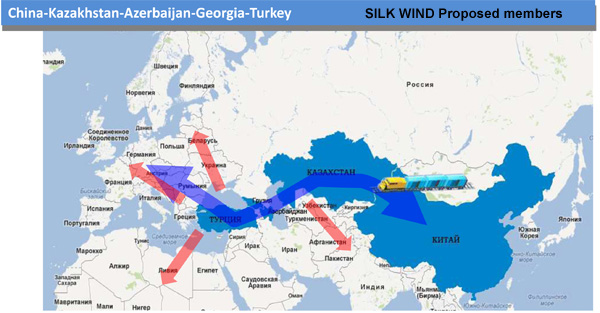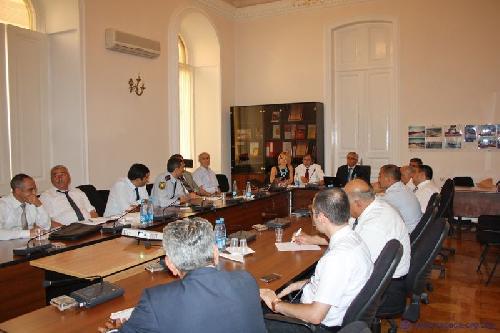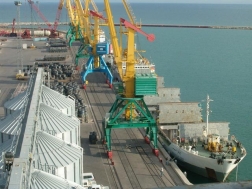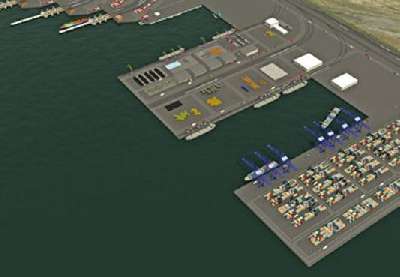 The first high-speed train, a part of the Silk Wind project, which will ensure the container transport on the China-Europe axis, will be launched this year. Within this project, the four states involved prepare the documentation for the signature of the intergovernmental agreement. After the completion of the infrastructure projects on this route, the Silk Wind train will cover the distance between West China and Istanbul in only 12 days.
The first high-speed train, a part of the Silk Wind project, which will ensure the container transport on the China-Europe axis, will be launched this year. Within this project, the four states involved prepare the documentation for the signature of the intergovernmental agreement. After the completion of the infrastructure projects on this route, the Silk Wind train will cover the distance between West China and Istanbul in only 12 days.
The creation of the first high-speed train for container transport on the route China-Kazakhstan-Caspian region-Azerbaijan-Georgia-Turkey-Europe (with a total length of 4,192 km), will be launched this year, but the countries participating in this project have not signed it yet. “The first block train will be formed on the route as part of the Silk Wind project next summer if the project partners sign the agreement in Astana by next spring. Much depends on Kazakhstan’s railways and on the Chinese direction. Basically, today Kazakhstan is working to attract cargo from China”, said National Secretary of TRACECA Intergovernmental Commission in Kazakhstan, Marat Saduov.
Initially, the Azerbaijani Government has agreed to sign the agreement on the Silk Wind, but now it has reconsidered the option, which would require a change.
To start the project, the working group meeting (at the end of February) gathered experts from Azerbaijan, Georgia, Kazakhstan and Turkey who have negotiated the elaboration of the intergovernmental agreement for which a number of suggestions and comments have been applied, explained Akif Mustafayev, Secretary General of TRACECA in Azerbaijan.
“The Kazakh side has proposed a tough schedule of legalization of the agreement, assuming its initialling in April in Tbilisi and its signing in May in Astana. Of course, a lot will depend here on the completion of the internal procedures in the countries involved. In our opinion, if the agreement is signed in 2014 and its realization is launched, it will be a stunning success of the project,” Mustafayev said.
Likewise, according to the system proposed by Kazakhstan, the containers from China will be delivered by rail to Aktau and from there by ferry to Baku and then by rail to the Georgian ports and by ferry to the ports in Turkey and Ukraine. In this final case, Silk Wind is combined with the Lithuanian-Ukrainian transport corridor Viking.
The countries participating in this project have highlighted their intention of implementing the project by adopting concrete measures aimed at establishing an adequate infrastructure which could provide uninterrupted, safe and high speed transport.
The service will accelerate the delivery of goods on China-Europe axis, a project which will determine the launch of new infrastructure projects such as Zhezkazgan-Beyneu line (Kazakhstan), Alyat Port (Azerbaijan), Baku-Tbilisi-Kars line (Azerbaijan, Georgia, Turkey) and Marmaray line (Turkey).
The states involved carry out infrastructure projects
For Kazakhstan, the project represents a stimulus for the development of the business environment, the transport and logistics system. Currently, Kazakhstan carries out infrastructure projects such as Altynkol station for trains to pass the Chinese border. “To ensure the transport of freight through Altynkol, a volume estimated at 25 million tonnes a year, according to the development plan of the station, six additional lines have to be built, as well as a car yard”, declared the director of KTZ branch in Almaty, Syezbek Alishev. Within the project, two terminals will be rebuilt and a third terminal will be commissioned for the transhipment of containers, the processing capacity being increased to 1,216 cars a day (over 14 million tonnes a year).
Another project for Silk Wind (on the Kazakh territory) is the launch of Zhetygen-Korgas line (293 km), which has an important role in reducing the distance from the Chinese border to the regions in southern Kazakhstan, Central Asia and the port of Aktau. Also, the transit capacity has been significantly increased due to the construction of the line Uzen-Turkmenistan border (146 km), Eraliev-Kuryk line section (14 km) and Arkalyk – Shubarkol (200 km) and Zhezkazgan-Beyneu lines (1000 km). “By launching the Zhezkazgan Beyneu and Arkalyk – Shubarkol lines, we can offer customers and trading partners the shortest direction for the freight transit from Europe to Asia (and vice versa)”, declared the Kazakh President Nursultan Nazarbayev, on the occasion of the presentation of projects (at the end of 2013).
Azerbaijan also implements transport infrastructure development projects, the most important one being the International Port and logistics centre in Alat, located about 70 km from Baku. The Port is located at the crossroads of two major transport corridors: East-West and North-South, an area where there are the Azerbaijan rail and road networks and it is considered as a vital point of freight transit for the trade between Europe and Asia. The new port is built in three phases on an area of 400 hectares, of which 100 will be for the international logistics centre. For the implementation of the first stage, the value amounts to USD 760 Million, an investment which will stimulate the growth of the freight volume to 10 million tonnes and 40,000 TEU and the investments for the execution of the second phase will increase the capacity to 17 million tonnes and 150,000 TEU. The completion of the entire project (including the third phase) will determine the increase of freight volumes to over 21 million tonnes and 1 million TEU. The port will always be a reference point for Azerbaijan within the Silk Wind project, but it will also contribute in the optimization of the container transport on the TRACECA Corridor, in the development of logistics services for the increase of the attractiveness of TRACECA route regarding the reduction of the travel time and costs. Also, this will determine the execution of transport hub in the Caspian region, the facilitation of intermodality and the development of container transport in the Caspian region.
Also, to attract the flow of goods, the Azerbaijani Government is implementing the development programme of railway transport using state financial resources and credits allocated by the World Bank.
Meanwhile, along with Georgia and Turkey, Azerbaijan executes the project Baku-Tbilisi- Kars, a line to be commissioned next year.








